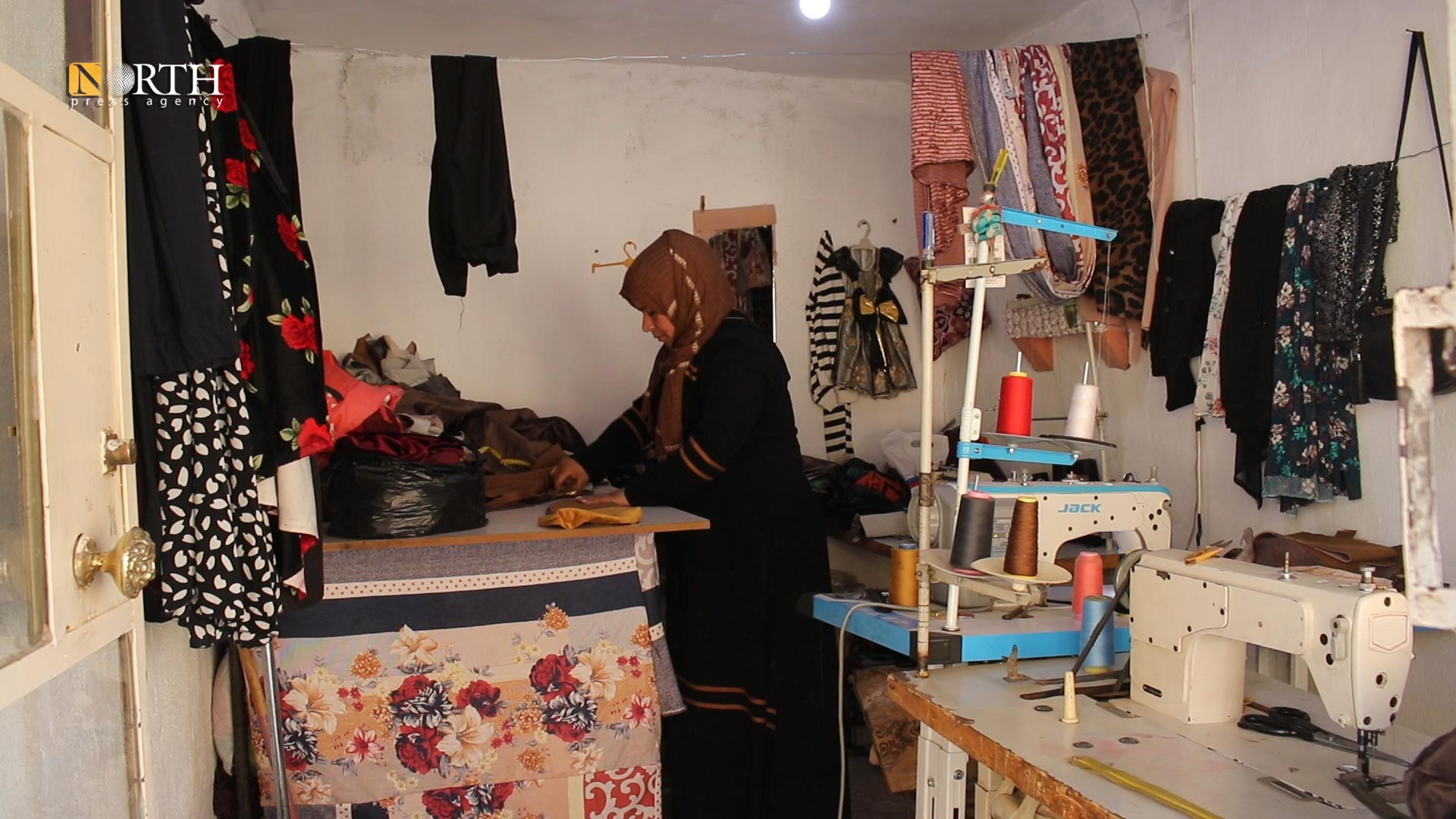IDP in Syria’s Qamishli strives to support fatherless family
QAMISHLI, Syria (North Press) – Shahida al-Anizi, an IDP from Aleppo, lives with her two children in the city of Qamishli in two small rooms with a limited set of equipment next to a smaller room she turned into a kitchen, endeavoring to have things ordered.
The poor house from outside is covered with blankets Shahida made to separate it from neighbors’.
After 12 hours of relentless work, the 35-year-old al-Anizi returns home exhausted. Without any rest she is preoccupied with house holding in the kitchen. At the end of the day, she sits with her two children that have arrived before her.
The woman, who is known as Maryam, has been living in the neighborhood of Um al-Fursan, in east of Qamishli, for ten years since she had left Aleppo. However, she changed the house she used to live in many a time.

While looking at both of her beloved children, one of them has never been to his home city, saying that she is preoccupied raising up her two children and secure their needs.
It emerges that verse of the famous Abbasid-era poet Abu al-Ṭayyib al-Mutanabbi “plights happen coincidently” is right and applies to al-Anizi’s case; first, it was the Syrian war, second, her husband lost his life, third, her house was destroyed.
She was burdened more living under a tent on the outskirts of Qamishli with two children stripped of all life necessities.
The woman could not deny that the absence of the father has burdened her with additional responsibilities to raise up the two children and earn them a living.
Nothing left in Aleppo
In her sewing shop, al-Anizi narrates stories from the past prior to the outbreak of the Syrian war in 2011. She led a “simple” life with her husband. Life was an easy one.
“He [her husband] was a worker in Aleppo, we were living a normal life in our house, and nothing happened,” she added.
However, one day in 2012, as he was going to his work, her husband was hit by a bullet that claimed his life. At the time, Aleppo was in the throes of heated battles between the Syrian government forces and the opposition factions, (Free Syrian Army).
As clashes approached her house and the security situation became worse, the woman- accompanied by her two children- left her house. She remained four months in the city however, moving between her relatives’ houses on the hope that one day situation could return calm.
However, the wind was running against the wishes of al-Anizi. Day after another Aleppo was becoming a more burning battleground. Her house was reduced to ashes. Her house was not an isolated case, the vast majority of Aleppo was made debris.
To secure her two children against a fate similar to that of her husband, al-Anizi left Aleppo, heading to Qamishli northeast the country in 2012.
The two children remember nothing of their house they used to live in in Aleppo. They had no idea about the look like of their father. When they left, one was seven months and the other was two years old.
In Qamishli, they had no capacity to rent a house so they have chosen to live under a tent on the outskirts of the busy city.
Private project
The mother and two children used to get awaken by scratch of stray dogs, trying to enter the tent notably in winter thus the women was pushed to move to live in a small house, lacking the simplest aspects of life and necessities. However, it is safer than a tent, according to al-Anizi.
In winter, she used plates and cookers for the leaking rain drops., and she used to cover the tent with torn fabric and blankets to bridge doors and windows.
In Qamishli, al-Anizi started to re-arrange her life in line with the new reality; she opened a sewing workshop in order to secure a living.
After nine years of saving money, the IDP was able to buy a sewing machine and rent a small shop close to Silo Roundabout in Qamishli, to commence a private project.
With very nominal prices that suit her clients’ outcomes, she sews bags and clothes and repairs items under demand.

“I myself went through a state of poverty and scarcity, I realize people’s situation…… I also consider customers’ poor conditions,” she noted.
Owing to her limited capacity, the IDP could not send her two children to the school. They work to give a hand of help to their mother. The family pays per month 150.000 SYP to meet the rent price of the house, workshop and generator monthly fees, not to mention their daily needs.
Replying to a question regarding a return to Aleppo, she said she will not return to Aleppo since nothing is left there.

